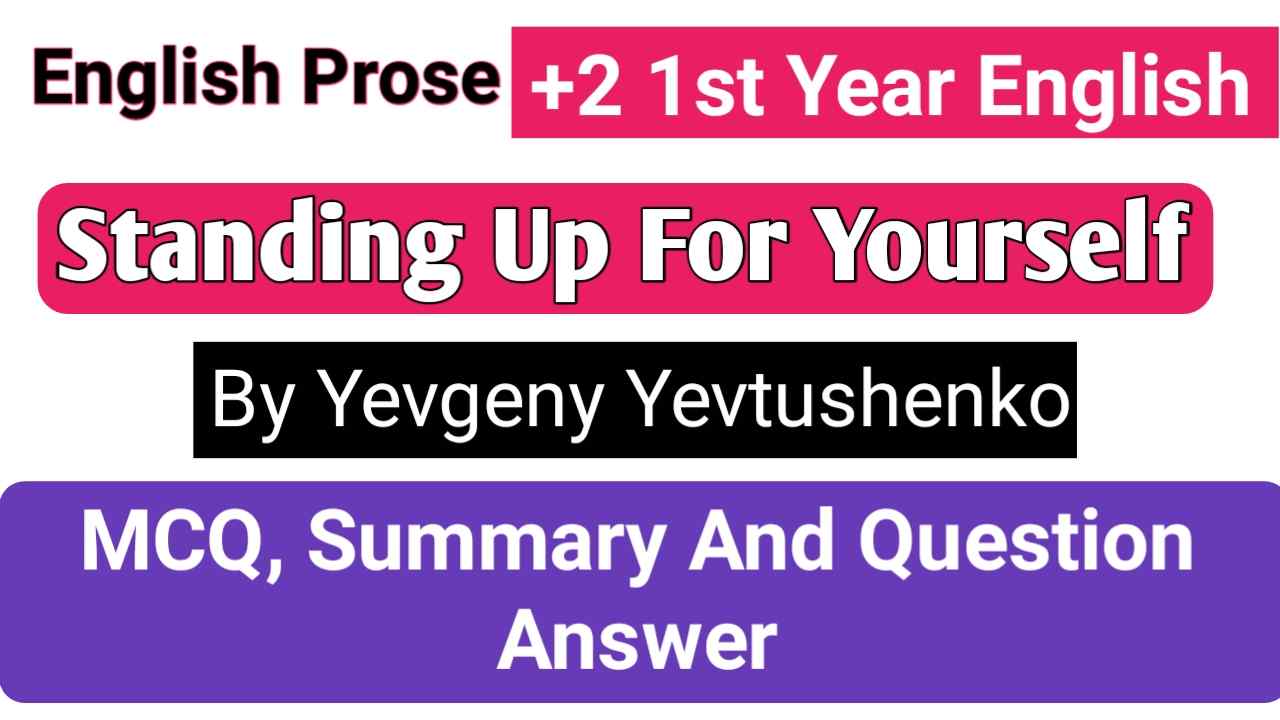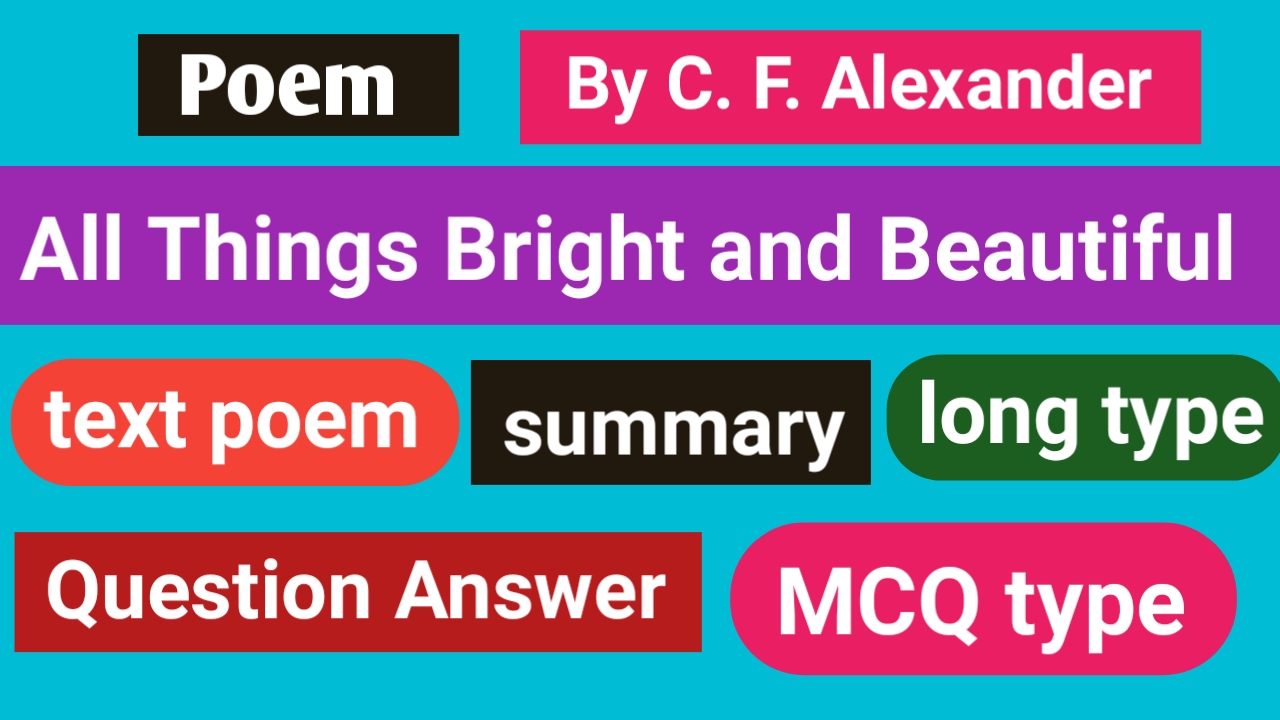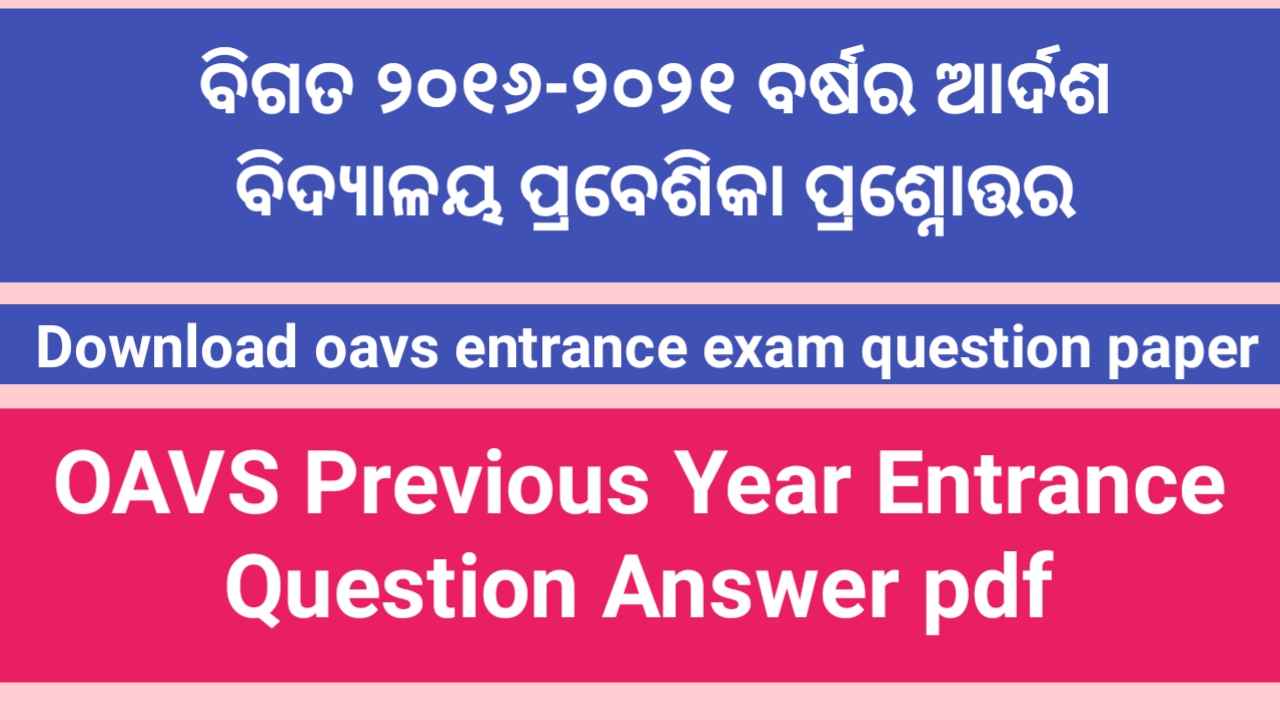Standing Up For Yourself Prose MCQ Question Answer And Summary Notes pdf CHSE+2
Standing Up For Yourself Prose MCQ Question Answer And Summary Notes pdf CHSE+2
Standing Up For Yourself Question Answer
Standing Up For Yourself Story MCQ Question Answer
(A) A co- director of film
(B) Director of film
(C) Film producer
(D) Film actor
Answer is (A) A co- director of film
7. The film in the warm up activity is an adaptation of a novel. What is that novel?
(A) The Novel A and Q Generation
(B) The Novel of the Young
(C) The Fall of paradise
(D) The Novel Q and A
Answer is (D) The Novel Q and A
8. The adaptation of the novel is done by an Indian author and diplomat. Who is he?
(A) Vikash Swarup
(B) Akas Swarup
(C) Nancy Swarup
(D) Loveleen Tandan
Answer is (A) Vikash Swarup
9. The story standing up for yourself, in the text is about_____
(A) A French child
(B) An Indian child
(C) A Russian child
(D) A Chinese child
Answer is (C) A Russian child
10. The child in the story standing up for yourself is _____
(A) A young film actor
(B) The author himself
(C) An English writer
(D) A story teller
Answer is (B) The author himself
(11) Where did the boy live?
(A) In a bungalow in Moscow
(B) In a slum in London
(C) In an empty flat in Moscow
(D) In a modest house in Paris
Answer is (C) In an empty flat in Moscow
(12) What had happened to author's parents?
(A) They were divorced.
(B) They were living together
(C) They were always quarreling.
(D) They were dead.
Answer is (A) They were divorced.
13. Where did the boy’s father live with his new wife according to the story?
(A) In Delhi
(B) In Baluchistan
(C) In Moscow
(D) In Kazakhstan
Answer is (D) In Kazakhstan
14. The word “troop” means _____
(A) herd
(B) dance party
(C) army
(D) group
Answer is (C) army
15. How did the child of the story standing up for yourself receive letters from his father ?
(A) often
(B) seldom
(C) every month
(D) none of these
Answer is (B) seldom
16. What was the mother of the author of the story standing up for yourself ?
(A) an anthropologist
(B) a geologist
(C) a historian
(D) a professor
Answer is (B) a geologist
17. Why did the child’s mother give up her work as a geologist ?
(A) to become an actress
(B) to became a dancer
(C) to become a singer
(D) to become a politician
Answer is (C) to become a singer
18. What was the child’s mother doing after leaving her work as a geologist ?
(A) working as a film director
(B) giving guidance to the youth for social work
(C) giving concerts for the troop as a singer
(D) giving training to the dancers
Answer is (C) giving concerts for the troop as a singer
19. What is the meaning of the word “front” in this story standing up for yourself ?
(A) in front of a place or street
(B) the border of a state
(C) a place where two armies are fighting in a war
(D) all of the above
Answer is (C) a place where two armies are fighting in a war
20. What is meaning of the word “concert” in the story standing up for yourself ?
(A) musical entertainment
(B) confrontation
(C) cooperation
(D) mutual effort
Answer is (A) musical entertainment
21. The author’s parents were divorced when the author was a _____
(A) a boy
(B) a young man
(C) a middle aged man
(D) quite grown up
Answer is (A) a boy
22. The narrator bought ______ textbook on material art.
(A) on fu-fitsu
(B) on ju-jitsu
(C) on lu-litsu
(D) gu-bitsu
Answer is (B) on ju-jitsu
23. What did the author want to do at whatever cost ?
(A) to conquer
(B) to win
(C) cleverness
(D) wise
Answer is (C) cleverness
24. The child’s fate pushed him to live a life ______
(A) in the street
(B) in luxury
(C) in danger
(D) none of these
Answer is (A) in the street
25. To swear smoke and spit were the child’s ____
(A) vice
(B) virtue
(C) good habits
(D) none of these
Answer is (A) vice
26. What is the mean by the word; elegantly?
(A) showing bad sense of style
(B) showing good sense of style
(C) attack somebody with style
(D) it is a style of dance
Answer is (B) showing good sense of style
27. Which habit the boy has kept to this day ?
(A) smoking
(B) spit elegantly through his teeth
(C) Keeping his fists at the ready
(D) all of these
Answer is (C) Keeping his fists at the ready
28. The another habit the boy had kept was ______
(A) fearful
(B) fearlessness
(C) cowardice
(D) none of these
Answer is (B) fearlessness
29. What kind of fear the boy had to overcome ?
(A) fear of those who were stronger
(B) fear of losing friendship
(C) fear of being robbed
(D) none of these
Answer is (A) fear of those who were stronger
30. What was the experience of the narrator in his childhood ?
(A) unhappy
(B) happy
(C) feeling of danger
(D) none of these
Answer is (A) unhappy
31. What in your opinion was the best lesson that the street taught to the narrator as a boy?
(A) spit elegantly
(B) to keep his fists at the ready
(C) not to be afraid of anything or anyone
(D) none of these
Answer is (C) not to be afraid of anything or anyone
32. The narrator was scared of someone in his childhood .Who was he ?
(A) a boy nicknamed Robin
(B) a man who was a murderer
(C) a boy nicknamed Red
(D) a friend of him who was a terror
Answer is (C) a boy nicknamed Red
33. How old was Red ?
(A) twenty years
(B) sixteen years
(C) eighteen years
(D) nineteen years
Answer is (B) sixteen years
34. ______was called the ruler of that street where the author lives as a boy.
(A) the child
(B) the author
(C) a boy named Red
(D) none of these
Answer is (C) a boy named Red
35. Red look liked _______ .
(A) big and broad-shouldered
(B) short and fatty
(C) tall and slim
(D) all of these
Answer is (A) big and broad-shouldered
36. What is the meaning of the word masterfully ?
(A) to behave like a master
(B) to do the mastermind work
(C) not caring for others
(D) none of these
Answer is (C) not caring for others
37. What is the meaning of the word gait ?
(A) manner of standing
(B) manner of sitting
(C) manner of talking
(D) manner of walking
Answer is (D) manner of walking
38. The expression “Like a seaman on his deck refers to” _______
(A) the author
(B) a seaman of the past
(C) the boy Red
(D) none of these
Answer is (C) the boy Red
39. What is the meaning of the word “peak” in this story standing up for yourself?
(A) the highest point
(B) lock of hair growing just above the forehead
(C) the top of a mountain
(D) all of these
Answer is (B) lock of hair growing just above the forehead
40. What is the meaning of the word cascade ?
(A) vast grassland
(B) waterfall
(C) a green belt
(D) the surface of the body of water
Answer is (B) waterfall
41. How was the face of Red described in this story standing up for yourself ?
(A) red flat face
(B) round pock-marked face
(C) black round pock-marked face
(D) none of these
Answer is (B) round pock-marked face
42. The green eyes of Red were compared with like that of a _____
(A) monkey
(B) tiger
(C) cat
(D) deer
Answer is (C) cat
43. _______ is the synonym of the word scorn ?
(A) angry
(B) contempt
(C) remark
(D) conserve
Answer is (B) contempt
44. Who referred the word Lieutenants in this story standing up for yourself ?
(A) assistants of Red
(B) friends of Red
(C) supporters of Red
(D) none of these
Answer is (C) supporters of Red
45. Red demanding ______from the boys stopping them on the road.
(A) to obey him
(B) money
(C) to steal for him
(D) to rob people on the way
Answer is (B) money
46. What did Red’s lieutenants do if somebody resisted ?
(A) beat him up hard
(B) keep him confined in a place
(C) leave him to go silently
(D) none of these
Answer is (A) beat him up hard
47. Red always carried _______ in his pocket.
(A) a knife
(B) a rifle
(C) a knuckle-duster
(D) a blade
Answer is (C) a knuckle-duster
48. Red carried a heavy metal duster for _______
(A) to attack
(B) for defence
(C) both for attack and defence
(D) none of these
Answer is (C) both for attack and defence
49. The narrator wants to conquer _____
(A) to attack
(B) fear of ghost
(C) fear of himself
(D) fear of Red
Answer is (D) fear of Red
50. The narrator _______ to win over his fear of Red.
(A) wrote a poem about him
(B) prayed God to give the strength
(C) decided to avoid him
(D) none of these
Answer is (A) wrote a poem about him
51. The poem that the narrator wrote in the form of _____.
(A) poem
(B) verse
(C) dialogue
(D) dialect
Answer is (B) verse
52. ________was the first piece of journalism of the narrator in verse .
(A) the first poem of the author
(B) the first article of the author
(C) the first short story of the author
(D) none of these
Answer is (A) the first poem of the author
53. _________method of wrestling is an advantage to the weak over the strong.
(A) Chinese method of wrestling
(B) Japanese method of wrestling
(C) German method of wrestling
(D) French method of wrestling
Answer is (B) Japanese method of wrestling
54. _______ game Red was playing sitting in the lawn when the narrator went out to meet him.
(A) chess
(B) vingt-et-un
(C) lengt-ut-sn
(D) oxat-ut-bun
Answer is (B) vingt-et-un
55. What was the author’s first remuneration as a poet ?
(A) a word of admiration by the people
(B) struck on his head with a knuckle-duster
(C) streaming with blood and lost consciousness
(D) none of above
Answer is (B) struck on his head with a knuckle-duster
56. Avoiding to meet Red in the second the author considers this act on his parties ?
(A) bravery
(B) cowardice
(C) cleverness
(D) wise
Answer is (B) cowardice
57. ______ was smiling crookedly at the narrator.
(A) people in the street
(B) Red
(C) Red’s lieutenants
(D) none of the above
Answer is (B) Red
58. _______ told this to _______. “So you write verses. Do they rhyme ?“
(A) Red to his lieutenants
(B) Red to the people in the street
(C) Red to narrator
(D) none of the above
Answer is (C) Red to narrator
59. ________ is the meaning of the word darted.
(A) moved slowly
(B) moved suddenly
(C) moved secretly
(D) moved upward
Answer is (B) moved suddenly
60. Knuckle-duster is a _______.
(A) lt is an iron knife.
(B) lt is an iron hammer.
(C) A metal covering for the knuckles for attack or defence.
(D) An axe type weapon.
Answer is (C) A metal covering for the knuckles for attack or defence.
61. What do you mean by the statement “the whole street knew it by heart” ?
(A) it was distributed to people of street
(B) The poem was popular among the people of the street.
(C) The street people sang the poem standing together.
(D) all of these
Answer is (B) The poem was popular among the people of the street.
62. What is the meaning of the word exulted ?
(A) showed displeasure and unhappiness
(B) showed physical and mental strength
(C) showed great joy and excitement
(D) showed bad temperament and excitement
Answer is (C) showed great joy and excitement
63. What is the meaning of the word triumphant ?
(A) feeling of victory with satisfaction
(B) feeling of victory with anger
(C) showing bad manner by winning something
(D) all of these
Answer is (A) feeling of victory with satisfaction
64. What is the meaning for the word phrase triumphant hatred ?
(A) feeling of victory over something or somebody you dislike
(B) feeling very bad after the victory
(C) showing bad manner after winning a match
(D) all of these
Answer is (A) feeling of victory over something or somebody you dislike
65. At _______ time the narrator one day met Red and his lieutenants.
(A) in the evening
(B) at night
(C) in the afternoon
(D) in the morning
Answer is (D) in the morning
66. The meaning of the phrase bore through is _____
(A) to look at somebody aggressively
(B) to threaten someone to kill
(C) to stare in a way that makes somebody feel uncomfortable
(D) all of the above
Answer is (C) to stare in a way that makes somebody feel uncomfortable
67. The meaning of the word drawl is ________.
(A) to say something speedily and angrily
(B) to say something speedily with longer vowel sounds
(C) to say something speedily with longer consonant sounds
(D) none of the above
Answer is (B) to say something speedily with longer vowel sounds
68. The meaning of the phrasal words impotent fury is _______.
(A) fruitful anger
(B) futile anger
(C) fruitful with no anger
(D) none of these
Answer is (B) futile anger
69. The meaning of the word vanquish is _______
(A) defeat completely
(B) win completely
(C) break somebody s power
(D) all of these
Answer is (A) defeat completely
70. The story "Standing Up For Yourself" is a / an _________.



Thanks for published you mcq question. It is help me for my exam. Thank you so much. 🙏🙏
ReplyDeleteThanku for published this mcq its help for my revision
ReplyDelete